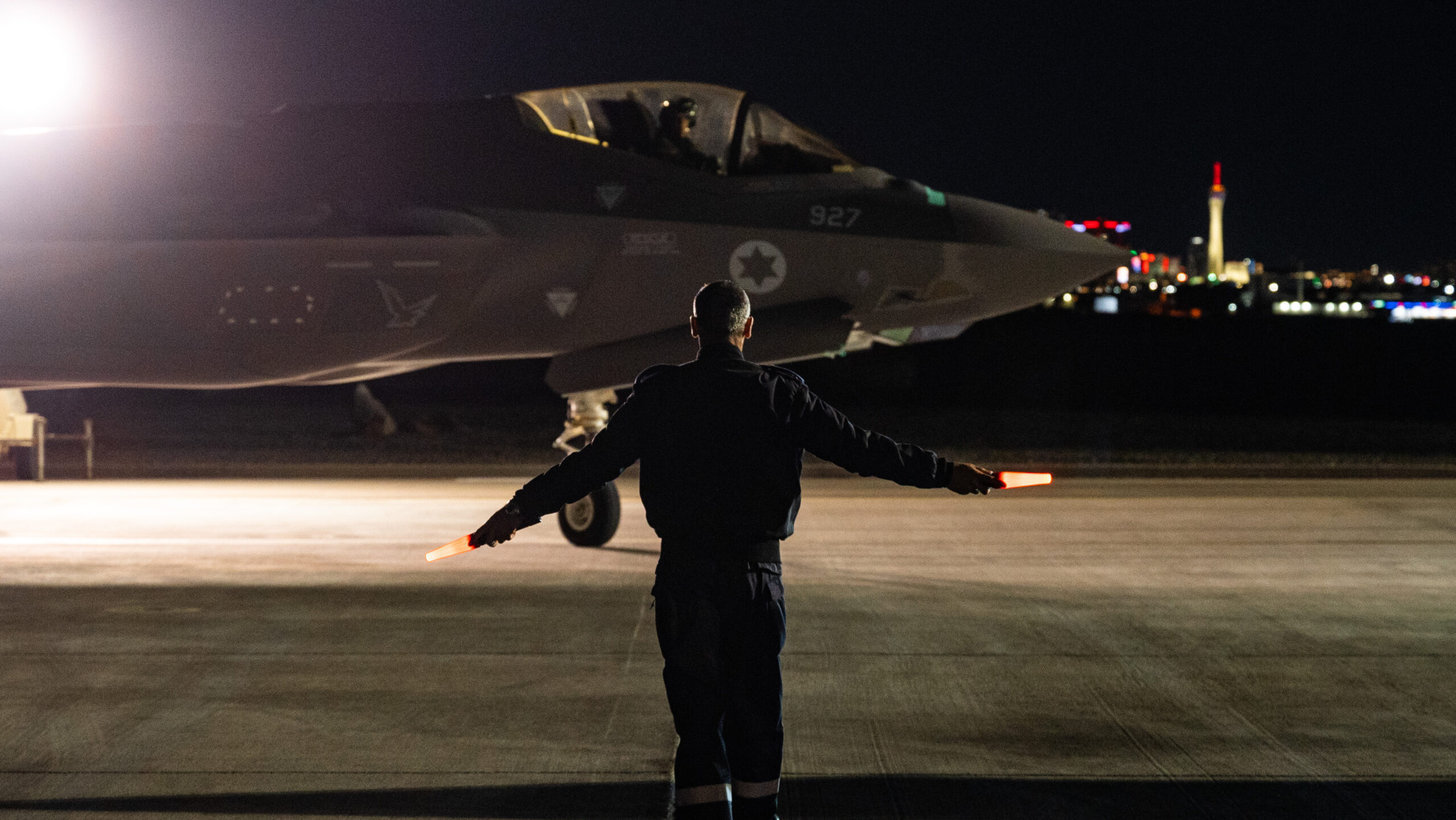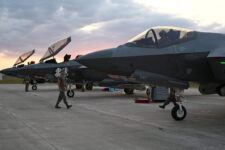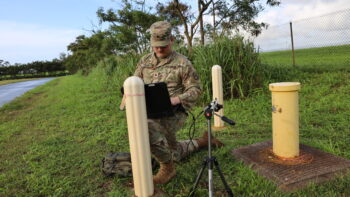
An Israeli Air Force official marshals an F-35I Adir to its spot after a Red Flag mission at Nellis Air Force Base, Nevada (US Air Force)
BELFAST — The Dutch Court of Appeal in the Hague has ordered the Netherlands government to stop exporting F-35 fighter jet parts to Israel inside the next 7 days after ruling that “there is a clear risk that serious violations of humanitarian law of war are committed in the Gaza Strip with Israel’s F-35 fighter planes.”
Human rights groups, led by Oxfam, brought the case to the Court of Appeal, calling for the ban of the parts to Tel Aviv after the Hague District Court refused to do so in a December 2023 judgment. The higher court overturned that decision on Monday, saying in a statement that it “rules in the favour” of Oxfam Novib (a Dutch affiliate of the human rights organisation), Peace Movement PAX Netherlands and the Rights Forum, “and orders the State to put an end to the further export of F-35 parts to Israel.”
It specifically ordered the state to stop supplying the parts “within 7 days,” though an analyst told Breaking Defense the move is largely symbolic.
Oxfam and the other human rights organisations argued that the export of the F-35 parts makes the Dutch state complicit in war crimes as the fighter jets are used in Israeli operations in the Gaza Strip.
A month after the Oct. 7 attacks by Hamas, reports emerged of Israel using the F-35I Adir fifth-generation fighter in the conflict, including IDF Chief of Staff Lt. Gen. Herzi Halevi confirming that one jet had been used in a close air support role to protect troops in the Gaza Strip. Tel Aviv operates two squadrons of the Lockheed Martin-made aircraft and has committed to acquiring a third.
“Israel does not take sufficient account of the consequences for the [Gaza Strip] civilian population when conducting its attacks,” said the Court of Appeal. “Israel’s attacks have caused a disproportionate number of civilian casualties, including thousands of children.”
Israeli political and military officials have consistently denied that its armed forces are committing war crimes in the Palestinian territory. The Hamas-controlled Health Ministry in Gaza says nearly 30,000 people have been killed since Israel launched reprisal attacks for the Oct. 7 Hamas assault that killed approximately 1,200 Israelis. The Israeli military says about 10,000 Hamas fighters are among the dead in Gaza.
Last month, the International Court of Justice ruled [PDF] that Israel must “take all measures within its power” to prevent the “destruction of Palestinian life in Gaza.”
The withholding of F-35 parts to Israel is unlikely to substantially impact IDF operations in Gaza because “Israel is not dependent on the Dutch warehouse [Woensdrecht Air Base], and the Americans might decide they will supply spare parts themselves,” said Patrick Bolder, a defense analyst at The Hague Centre for Strategic Studies think tank and retired lieutenant colonel from the Royal Netherlands Air Force.
RELATED: After Hamas attack, US rushed new F-35 capabilities, parts to Israel, officials say
Woensdrecht is a regional F-35 maintenance and logistics hub that houses and distributes aircraft parts of the combat jet to European and international partners including Israel. A Dutch military export permit is required for their transfer. It was first issued in 2016, noted the Court of Appeal.
“They [Israel] don’t need the F-35 for the operations they are currently conducting over Gaza because they are very well capable of conducting precision ground attacks with their F-15s and F-16s,” said Bolder.
Al Jazerra reported in November that Israel, which has a fleet of around 170 F-16s, across all versions, is thought to fly an average of 1.5 combat missions a day with the fourth-generation platform. By contrast, the F-35 has been used much more sparingly during the conflict.
“It is overqualified because there’s no ground to air threat,” said Bolder. “Hamas terrorists don’t have any weapons, really, to make flying over Gaza difficult or dangerous for Israeli pilots.”
He added that the Court of Appeal decision “doesn’t make a lot of difference to the Israelis, or doesn’t stop the atrocities against the Palestinian people.”
The Dutch ruling comes amid Israeli Prime Minister Benjamin Netanyahu’s threat to launch a ground offensive in Rafah against Hamas in the southern tip of the Gaza Strip, estimated to host a population of 1.4 million civilians.
He has vowed to carry out the new military operation in order to achieve victory, but the international community, including US and European officials, remain critical of the plan on the basis that it would worsen the already dire humanitarian crisis, with civilians unable to evacuate the area or seek refuge elsewhere.
“A large-scale military operation in Rafah would have catastrophic humanitarian consequences,” said outgoing Dutch prime minister, Mark Rutte in an X [formerly Twitter] post today, ahead of a meeting with Netanyahu in Israel and a separate discussion with Palestinian Prime Minister Mohammad Shtayyeh.
Rutte said his trip to the Middle East would focus on three priorities and that there must be an “immediate pause” to fighting.
He wrote of the need for additional humanitarian aid in Gaza to be rolled out; the release, by Hamas, of “more than 100 hostages” and called on Israeli forces to reduce the “intensity” of their Gaza campaign.
Israel signs $583 million deal to sell Barak air defense to Slovakia
The agreement marks the latest air defense export by Israel to Europe, despite its ongoing war in Gaza.


























